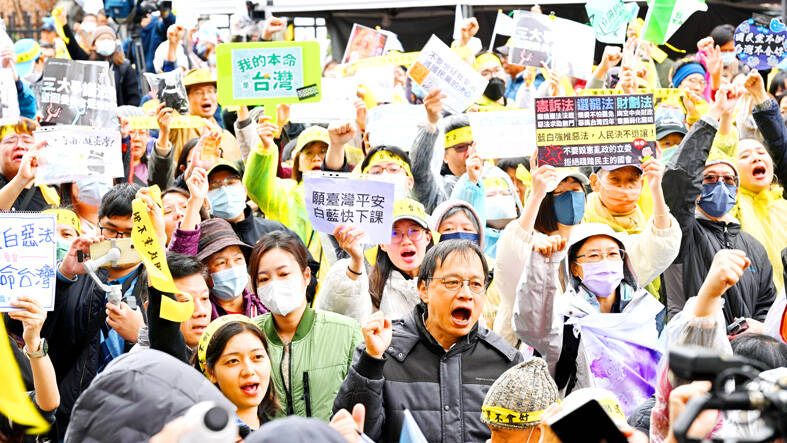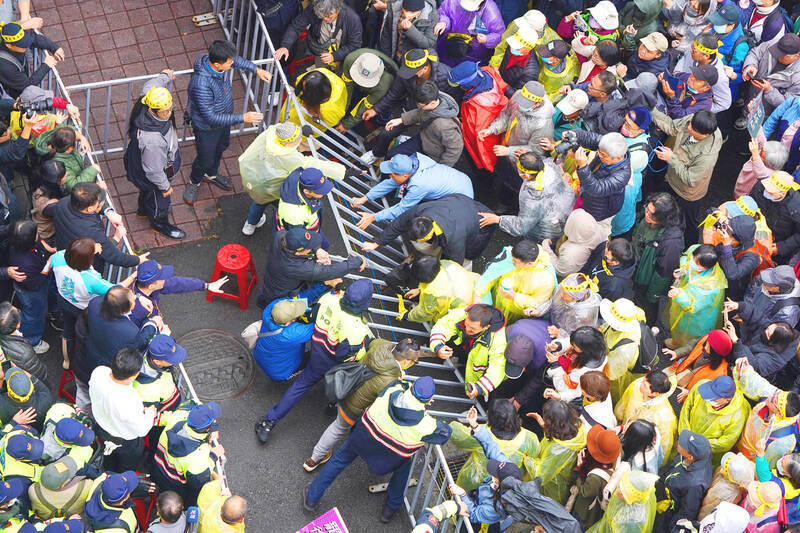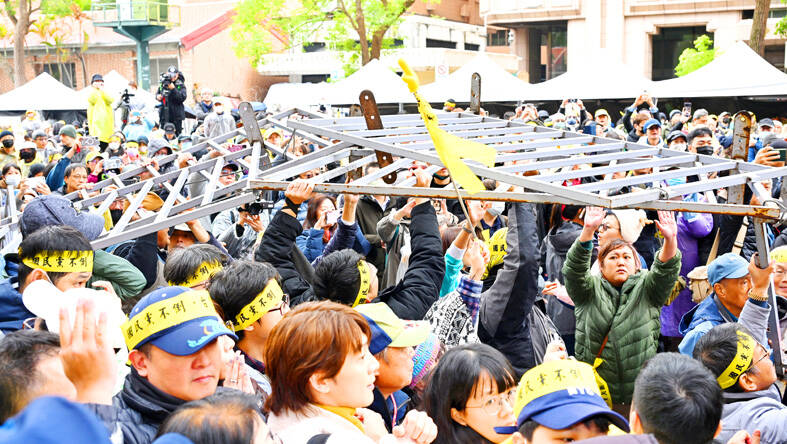“Bluebird movement” groups yesterday tried but failed several times to break into the Legislative Yuan as they sought to disrupt opposition legislators’ attempt to pass amendments to laws governing the recalling of elected officials, the Constitutional Court and government revenue.
Smaller protests were also held in Taichung and Kaohsiung against the proposed amendments to the Public Officials Election and Recall Act (公職人員選舉罷免法), the Constitutional Court Procedure Act (憲法訴訟法) and the Act Governing the Allocation of Government Revenues and Expenditures (財政收支劃分法).
Speeches began at the protests in the morning, with organizers saying more than 15,000 people were at the Taipei rally by evening.

Photo: Chen Yi-kuan, Taipei Times
Protesters removed metal barricades in clashes with police at about 11:30am as they tried to access the Legislative Yuan from a side entrance on Jinan Road, a move reminiscent of the Sunflower movement 10 years ago.
After 4pm, groups at the front entrance on Zhongshan S Road attempted to get inside, but were repelled by police.
Among the protesters was independence advocate Rishen Wu (吳日昇), who said that strong coordinated efforts are needed like when Sunflower movement protesters in 2014 climbed over the gates to occupy the main legislative chamber to stop the Chinese Nationalist Party (KMT) “from dismantling Taiwan’s democracy.”

Photo: CNA
It was the third day of protests against the attempts to pass the three amendments.
Dubbed the “Bluebird wintertime action,” the protests were organized by Taiwan Citizen Front and the Economic Democracy Union, with other groups, independence advocates and members of small political parties, including the New Power Party (NPP), the Taiwan Statebuilding Party, the Green Party and the Taiwan Obasang Political Equality Party attending.
“We have seen violent conduct and violation of proper procedures by the KMT, led by caucus whip Fu Kun-chi (傅?萁),” Economic Democracy Union convener Lai Chung-chiang (賴中強) told reporters in the afternoon. “Ramming through votes on third readings is Fu’s way, which he copies from the Chinese Communist Party.”

Photo: Chen Yi-kuan, Taipei Times
“We want to thank all Democratic Progressive Party [DPP] legislators for laying their bodies in harm’s way to try and stop the voting,” Lai added. “While the three bills will likely pass their third readings, we must fight on to defend Taiwan’s freedom and democracy. So I urge the DPP to appeal for legal injunctions and file for constitutional interpretations on these three bills.”
NPP Chairwoman Claire Wang (王婉諭) on social media called on protesters to stay overnight at the legislature “to show people’s anger about such abuse of power.”
Cabinet spokeswoman Michelle Lee (李慧芝) said that Premier Cho Jung-tai (卓榮泰) appreciates that people took to the streets to safeguard democracy and hopes that Legislative Speaker Han Kuo-yu (韓國瑜) could put aside controversial bills that make people anxious.
More than 100 people gathered at Taichung Railway Station holding placards saying: “We are here to protect Taiwan,” “Down with the KMT bill to undermine the Constitutional Court” and “against the expenditure bill for disbursing funds locally to win elections.”
Dozens assembled at a park in Kaohsiung, carrying placards accusing the KMT of using “martial law tactics.”

Chinese Nationalist Party (KMT) Chairman Eric Chu (朱立倫), spokeswoman Yang Chih-yu (楊智伃) and Legislator Hsieh Lung-chieh (謝龍介) would be summoned by police for questioning for leading an illegal assembly on Thursday evening last week, Minister of the Interior Liu Shyh-fang (劉世芳) said today. The three KMT officials led an assembly outside the Taipei City Prosecutors’ Office, a restricted area where public assembly is not allowed, protesting the questioning of several KMT staff and searches of KMT headquarters and offices in a recall petition forgery case. Chu, Yang and Hsieh are all suspected of contravening the Assembly and Parade Act (集會遊行法) by holding

PRAISE: Japanese visitor Takashi Kubota said the Taiwanese temple architecture images showcased in the AI Art Gallery were the most impressive displays he saw Taiwan does not have an official pavilion at the World Expo in Osaka, Japan, because of its diplomatic predicament, but the government-backed Tech World pavilion is drawing interest with its unique recreations of works by Taiwanese artists. The pavilion features an artificial intelligence (AI)-based art gallery showcasing works of famous Taiwanese artists from the Japanese colonial period using innovative technologies. Among its main simulated displays are Eastern gouache paintings by Chen Chin (陳進), Lin Yu-shan (林玉山) and Kuo Hsueh-hu (郭雪湖), who were the three young Taiwanese painters selected for the East Asian Painting exhibition in 1927. Gouache is a water-based

Taiwan would welcome the return of Honduras as a diplomatic ally if its next president decides to make such a move, Minister of Foreign Affairs Lin Chia-lung (林佳龍) said yesterday. “Of course, we would welcome Honduras if they want to restore diplomatic ties with Taiwan after their elections,” Lin said at a meeting of the legislature’s Foreign Affairs and National Defense Committee, when asked to comment on statements made by two of the three Honduran presidential candidates during the presidential campaign in the Central American country. Taiwan is paying close attention to the region as a whole in the wake of a

OFF-TARGET: More than 30,000 participants were expected to take part in the Games next month, but only 6,550 foreign and 19,400 Taiwanese athletes have registered Taipei city councilors yesterday blasted the organizers of next month’s World Masters Games over sudden timetable and venue changes, which they said have caused thousands of participants to back out of the international sporting event, among other organizational issues. They also cited visa delays and political interference by China as reasons many foreign athletes are requesting refunds for the event, to be held from May 17 to 30. Jointly organized by the Taipei and New Taipei City governments, the games have been rocked by numerous controversies since preparations began in 2020. Taipei City Councilor Lin Yen-feng (林延鳳) said yesterday that new measures by